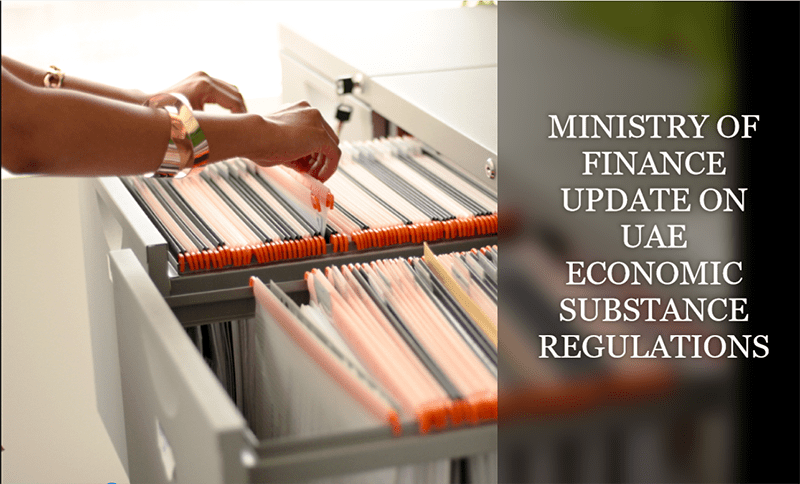Ministry of Finance: Update on UAE Economic Substance Regulations

See our previous articles on this subject:
- Introduction of Economic Substance Regulation in the UAE
- Update: Background of Introduction of Economic Substance Regulations in the UAE
MINISTRY OF FINANCE UPDATE ON UAE ECONOMIC SUBSTANCE REGULATIONS
Following the update on the directives for implementation of ESR dated 11 September 2019, the Ministry of Finance (MoF) has released an Amendment to the UAE Economic Substance Regulations on 10th and 19th of August 2020, respectively:
- Cabinet Resolution No. 57 of 2020 (“Resolution”); and
- Ministerial Decision No. 100 of 2020 (“Ministerial Decision”).
These directives have now repealed and replaced the original ES Regulations; Cabinet Resolution No. 31 of 2019 and Ministerial Decision No. 100 of 2020. The new ES Regulations are applicable retrospectively from 1 January 2019.
Several to the many changes and clarifications brought by the Resolution and Ministerial Decision is highlighted below.
1. LICENSEE DEFINITION
PREVIOUS ESR: Natural” or “Juridical” person licensed by the competent licensing authority/ authorities in the UAE to carry out a Relevant Activity in the UAE, including a Free Zone and a Financial Free Zone.
NEW ESR: (a) Juridical persons (persons with separate legal personality) and (b) Unincorporated partnerships that carry on a relevant activity in the UAE. Natural persons, sole proprietors, trusts, and foundations are no longer in scope under the amend-ed ES regulations, and therefore do not need to file a notification or meet the Economic Substance Test.
2. DEFINITION OF CONNECTED PERSON AND GROUP
PREVIOUS ESR: Connected Person. A natural or juridical person who is related to one or more juridical person(s) through direct or indirect ownership or control, or common control. Group. No definition.
NEW ESR: Connected Person. A company that is part of the same Group as the Licensee or the Exempted Licensee. Group. Two or more companies are related through ownership or control such that they are required to prepare consolidated financial statements for financial reporting purposes under the accounting standards applicable thereto.
3. CONSIDERATION OF BRANCHES
- UAE branch of a UAE company
PREVIOUS ESR: No information is provided.
NEW ESR: The branch registered in the UAE of a UAE parent entity must file a single notification and (if applicable) a single economic substance report in relation to the relevant activities of itself and all its UAE branches.
- A foreign branch of a UAE company
PREVIOUS ESR: No information is provided.
NEW ESR: The UAE company does not need to report the relevant activities of the foreign branch, provided that the foreign branch is subject to tax on all its relevant income in its foreign jurisdiction.
- UAE branch of a foreign company
PREVIOUS ESR: No information is provided.
NEW ESR: The UAE branch of a foreign company is not subject to ESR if all relevant income is subject to tax in the foreign parent/head office jurisdiction.
4. EXEMPTED LICENSEES
PREVIOUS ESR: Only entities in which the UAE government (at the federal/emirate level) has at least 51% direct or indirect ownership.
NEW ESR:
- Investment Funds which includes the companies that directly / indirectly invest such funds.
- Foreign tax resident entities
- Companies that are wholly owned by UAE resident visa holders who reside in the UAE and that are not part of a Multi-National Enterprise (MNE) group and business activities carried only outside the UAE.
- UAE branches of foreign companies whose relevant income is subject to corporate tax in the jurisdiction of the foreign head office/parent.
- Along with filing a notification, exempt companies must submit a tax residence certificate/letter from the foreign company jurisdiction that shows that the company is a resident for corporate income tax purposes. This is to substantiate and benefit from their exempt status.
- Companies that are indirectly or indirectly owned (at least 51%) by the UAE government are no longer specifically exempted under the new ES Regulations.
5. GROSS INCOME
PREVIOUS ESR: No definition provided.
NEW ESR: All income from any kind of source derived, without deducting any type of cost or expenditure.
6. REGULATORY AUTHORITY AND INTRODUCTION OF NATIONAL ASSESSING AUTHORITY
PREVIOUS ESR: Not introduced.
NEW ESR: The UAE Federal Tax Authority (FTA) has been appointed as the National Assessing Authority to control and oversee compliance with the new ES Regulations. FTA is also in-charge of imposing administrative penalties on non-compliance Licensees. On the other hand, respective Regulatory Authorities in the UAE will be responsible for checking and collecting notifications submitted by the Licensees.
7. FILING OF NOTIFICATIONS
PREVIOUS ESR: No specified date: general information to follow to respective Regulatory Authorities’ deadlines.
NEW ESR: Notification and notification requirements to be submitted electronically through the MOF online portal after it goes live. The directives do not state the deadline for both submission and resubmission. Notification is required to be given within 6 months after the end of the respective financial year-end (e.g. 31st December – Notification by 30th June), while Re-notification in respect of previously filed notifications.
8. OUTSOURCE ACTIVITIES OTHER THAN CIGAs
PREVIOUS ESR: No information is provided.
NEW ESR: Activities that are not related to CIGAs can be outsourced from third-party service providers - even they are located outside the UAE, which will not have an adverse effect on the economic substance of the Company in the UAE (i.e back-office functions, IT, payroll, legal services, expert professional advice or specialist services provided).
9. OUTSOURCING CIGA
PREVIOUS ESR: No information is provided.
NEW ESR: A Company can outsource any or all CIGAs if the out-sourced activities are performed inside the UAE. Additional documentation will be needed. It is not a requirement for a company to perform all the Core Income Generating Activities (“CIGAs”) listed in the ES regulations for a specific relevant activity. However, whichever of the CIGAs that generate relevant income must be performed in the UAE.
10. BOARD MEETINGS
PREVIOUS ESR: Minimum of 1 Board Meeting per Financial Year.
NEW ESR: No specified number of board meetings is required. Minutes of meetings should be held physically inside the UAE by the company’s board members. Board members are not required to be UAE resident visa holders. However, Holding Companies are not required to be directed and held in the UAE unless required by the relevant licensing authority.
11. PRESERVATION OF RECORDS AND INFORMATION
PREVIOUS ESR: No information is provided.
NEW ESR: Both Licensee and Exempted Licensee must preserve all relevant documents, information, and records required by Licensee to meet UAE ESR requirements for a period of 6 years from the end of the company’s Financial Year. All documents must be kept in English.
12. COMPLIANCE DURING LICENSEE LIQUIDATION
PREVIOUS ESR: No information is provided.
NEW ESR: Meeting the new ES Regulations while the Licensee (carrying out any of the relevant activity) is during its winding-up process, requires it to meet the compliance requirements until the company is eventually wound up.
CHANGES TO SEVERAL "RELEVANT ACTIVITIES"
A. DEFINITION OF HIGH-RISK IP LICENSEE
PREVIOUS ESR: A licensee which meets all the following conditions
1. The licensee did not create the IP which it holds for the purpose of business
2. License acquire the IP from either:
- A group company, or
- In consideration for funding the research and development by another person situated in a foreign jurisdiction.
The licensee licenses or has sold the IP Asset to one or more group companies or otherwise earns a separately identifiable gross income (e.g. Royalties, license fees) from a foreign group company in respect of the use or exploitation of the IP Asset.
NEW ESR: A Licensee that meets the conditions such as:
1. The Licensee did not create Intellectual Property Assets.
2. The IP Asset was acquired by the Licensee from a Connected Person or from funding research and development in a foreign jurisdiction.
The Licensee licenses or has sold the IP assets or earns separately identifiable income from a Foreign Connected Person in respect of the use or exploitation of the IP asset.
- A High-Risk IP Licensee is deemed to provide documents like a business plan and have adequate qualified local full-time staff. Ultimately, the Licensee needs to prove that the decision making is held inside the UAE.
- The new ES Regulations has expanded the cases where information would be exchanged with foreign competent authorities from being a disciplinary measure (or related to High-Risk IP) to confirm tax residency of UAE entities and branches.
B. DISTRIBUTION BUSINESS
PREVIOUS ESR: Goods were required to be imported and stored in the UAE.
NEW ESR: To acquire from a foreign connected person component parts, materials for goods; ready-sale goods, or reselling such. The scope towards drop-shipping has been included.
C. SERVICE CENTRE BUSINESS
PREVIOUS ESR: Services were required to be provided in connection with business outside the UAE
NEW ESR: To provide services to foreign Connected Persons. The scope widens and includes services provided to foreign connected persons in connection with their business in the UAE.
D. HOLDING COMPANY BUSINESS
PREVIOUS ESR: Holding companies are defined under the UAE Commercial Companies Law, or as per the free trade zone authorities which normally adhere to a majority control/management/ownership standard for Holding companies.
NEW ESR: A Licensee that has its sole function such as acquiring and holding shares, and interests from other companies; capital gains and dividends are earned from those interests. It seems that having marginal proprietorship in other companies possibly leads to categorizing an entity as a holding company.
CONCLUSION
It is strongly recommended that all UAE companies must assess or reassess whether and which of their business activities fall within the scope of the new UAE Economic Substance Regulations and prepare resulting compliance requirements accordingly. It is also advisable that UAE companies should ensure that they can meet the Economic Substance Test in respect of each relevant activity.
The amended UAE ES Regulations and Guidance provide some additional clarity with respect to the scope and application of the economic substance requirements in the UAE. Followed by these changes, the UAE has become more aligned with the principle of OECD and BEP’s forecast framework for an international tax system.
The amendments in the new regulations have also made the UAE more aligned with certain rules of the other ESR-enacting jurisdictions such as The Cayman Islands, British Virgin Islands, Bahrain, etc.
Information on the launching of MOF’s Portal (to facilitate the electronic filing of notifications, economic substance reports, and all other relevant information and documents.), including the portal’s rules and procedures shall be published on the MOF’s website.
If you are looking to comprehend the implications of the amendments made in the ES Regulations, please feel free to send GARANT BUSINESS CONSULTANCY DMCC on our email at info@garant.ae.
MARSEL SHADMANOV
Head of Corporate Services of Garant Business Consultancy

PANKAJ KANJANI
Senior Tax Consultant of Garant Business Consultancy
